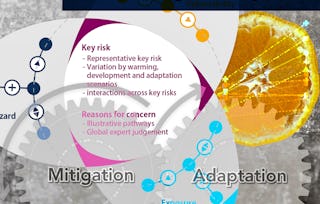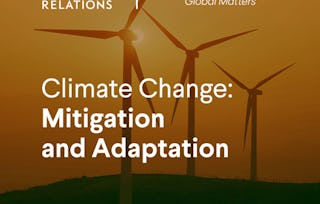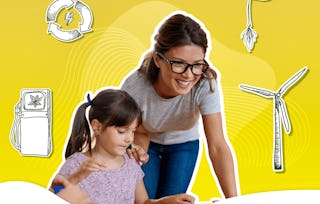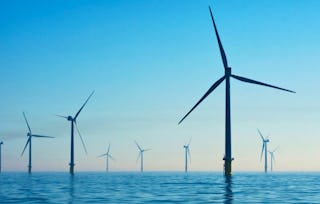This course focuses on the climate impacts occurring and expected to occur across the United States. Our approach will be regional and sectoral, with consideration of impacts on water resources, transportation, energy, agriculture, forests, health, and coastal/marine resources. We will also look at how you can apply information about climate risks to motivate climate action in your household, in your community, or in your workplace.

Planning with Climate Change in Mind
Ends soon: Gain next-level skills with Coursera Plus for $199 (regularly $399). Save now.

Planning with Climate Change in Mind
This course is part of Exploring Our Responses to Climate Change Specialization

Instructor: Joseph Casola
5,606 already enrolled
Included with
(79 reviews)
What you'll learn
Navigate the National Climate Assessment as a resource for information about impacts and adaptation
Describe how place and context relate to climate risk and potential mitigation and adaptation choices
Identify opportunities for communities, governments, and businesses to manage climate risks
Explain the challenges and competing interests that make climate change a difficult issue for communities, governments, and businesses to address
Skills you'll gain
Details to know

Add to your LinkedIn profile
See how employees at top companies are mastering in-demand skills

Build your subject-matter expertise
- Learn new concepts from industry experts
- Gain a foundational understanding of a subject or tool
- Develop job-relevant skills with hands-on projects
- Earn a shareable career certificate

There are 3 modules in this course
Climate change affects almost all sectors of our economy. This module will summarize key messages regarding these impacts, drawing upon the Fourth National Climate Assessment.
What's included
8 videos1 reading1 assignment
Across the country, climate impacts are occurring. These impacts often affect the places and resources that are intertwined with our livelihoods and identities. This module takes a regional approach, drawing upon the Fourth National Climate Assessment.
What's included
6 videos1 reading1 assignment
This module provides examples and resources for taking climate action on your own.
What's included
7 videos1 reading2 assignments1 peer review
Earn a career certificate
Add this credential to your LinkedIn profile, resume, or CV. Share it on social media and in your performance review.
Instructor

Offered by
Explore more from Environmental Science and Sustainability
 Status: Preview
Status: PreviewThe University of Tokyo
 Status: Free Trial
Status: Free TrialCouncil on Foreign Relations
 Status: Free Trial
Status: Free TrialBanco Interamericano de Desarrollo
 Status: Free Trial
Status: Free TrialUniversity of Colorado Boulder
Why people choose Coursera for their career




Learner reviews
79 reviews
- 5 stars
91.13%
- 4 stars
8.86%
- 3 stars
0%
- 2 stars
0%
- 1 star
0%
Showing 3 of 79
Reviewed on Jun 12, 2022
Really nice instruction on how to tap into further planning resources, both government and private. Very useful information!
Reviewed on Mar 14, 2022
Great teacher, good content. Be aware, that the peer review at the end of the course may take more than one week.
Reviewed on Dec 11, 2022
Very interesting topic which will definitely influence not only my commitment to climate change, risks and mitigations but on a personal level as well.
Frequently asked questions
To access the course materials, assignments and to earn a Certificate, you will need to purchase the Certificate experience when you enroll in a course. You can try a Free Trial instead, or apply for Financial Aid. The course may offer 'Full Course, No Certificate' instead. This option lets you see all course materials, submit required assessments, and get a final grade. This also means that you will not be able to purchase a Certificate experience.
When you enroll in the course, you get access to all of the courses in the Specialization, and you earn a certificate when you complete the work. Your electronic Certificate will be added to your Accomplishments page - from there, you can print your Certificate or add it to your LinkedIn profile.
Yes. In select learning programs, you can apply for financial aid or a scholarship if you can’t afford the enrollment fee. If fin aid or scholarship is available for your learning program selection, you’ll find a link to apply on the description page.
More questions
Financial aid available,
¹ Some assignments in this course are AI-graded. For these assignments, your data will be used in accordance with Coursera's Privacy Notice.





